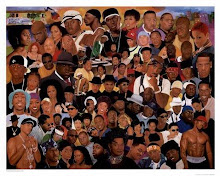Below I've written a response to The Case of Myron Rolle, an article on the Liberator Magazine's blog. It is my rejection of narrow solutions and simple explanations; my attempt to debunk anecdotal evidence as the answer to large social problems. The answer to racial and economic inequality will not happen with one key, or through one door.
The Myron Rolle article attempts to link the need for greater Black achievement, with engaging in a variety of cultural and social activities: sports, reading, chess, etc. The argument being: engaging in varied social behaviors and environments shouldn't be associated with "acting White," but rather as the model for socio-economic success. Educational achievement is the way for Blacks to achieve social equality.
Here is my response to this argument and the article overall. It is time for us to be real about the purpose and value of education.
-------------
We need to debunk the "education as the silver bullet to all social inequality" solution. I say that not to imply that educational success needs to be devalued or de-emphasized, but to cease education being isolated as the most important tool for a just society. Bottom line: how many college educated people you know who don't have a job? Scarier: how many of them are the kids who worked hard; did the right thing; studied crazy; all to achieve that other sacred goal: a college degree.
My point is that educational success is deeply embedded in the whole of society---in a racial, political, economic, gendered context. These social factors profoundly shape "achievement." They are the difference between charter schools and "regular" public schools; between those schools and private schools; and between a "regular" public school in the South Bronx or East New York, and one in Scarsdale or Rockland County.
So when the author of this post exhorts their educational success, the fact that they went to a private school matters...a lot. Yes, they had a high level of self-determination. Yes, they had a committed support system. And yes, those are most often the same traits we see in successful athletes and sports at all levels. Certainly I can agree that we need to replicate those best outcomes to better the situation of our folk. But there are other factors that significantly effect "success:" our families; our parents' jobs; incomes; family histories; public policy, etc. Many people overcome these things, and God bless them. But overcoming hindrances is the exception, not the rule.
You eat three meals a day? Certainly helps you study longer. Drinking organic apple juice ($5.99 and up) instead of Top Pop sodas (50 cents to a $1 in a hood near you), is definitely better for your health and your attention span. You have money to call the plumber to fix your drainage problem; instead of being mad at the landlord because they refuse to address your roach infestation problem? Absolutely a physical and mental health difference right?
THOSE THINGS AFFECT EDUCATIONAL OUTCOMES. Just as much as "good" teachers; and "focused" students.
The author neglects this, as do too many educators. As a group, we got to start looking at problems this way; instead of in compartmental ways.
Most importantly we certain need to shift to a group achievement paradigm. But I think this has to happen not in an "every one is smart" type of way, because promoting equality like this isn't always healthy. Fact is: everyone can't run as fast as Usain Bolt; play ball like Lebron; write as lucidly as Baldwin or Morrison; or community organize like Ella Baker. This is not to quell the audacity to aspire for greatness. But it's to recognize what you do have; what you can do; what you do well. Of course the line between settling and striving, or practicality and dreaming, is very thin. Bottom line though, is our people need a group achievement model, and this model must include...EVERYTHING: poets, musicians, mathematicians, environmentalist, medical doctors, dramatist, etc.
Instead of making "intelligent" relative, why not make the dignity of every person fundamental; and respect their humanity. Sanitation workers are as valuable and respected as the Fortune 500 exec. The social worker is just as dignified as the heart surgeon. Respecting the dignity of every person's humanity, and exhibiting that respect in how we view abilities and talents, that should be our avenue to thinking as a group.
Michael Partis
michaelpartis@gmail.com
http://twitter.com/DaHoodsAdvocate
http://michaelpartis.blogspot.com/
Sunday, January 17, 2010
Subscribe to:
Posts (Atom)
